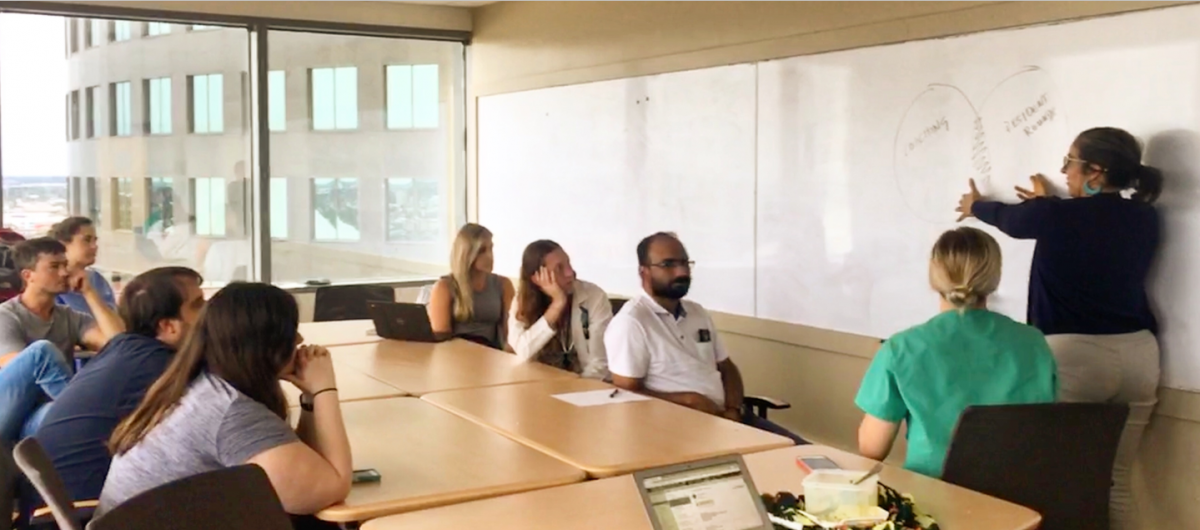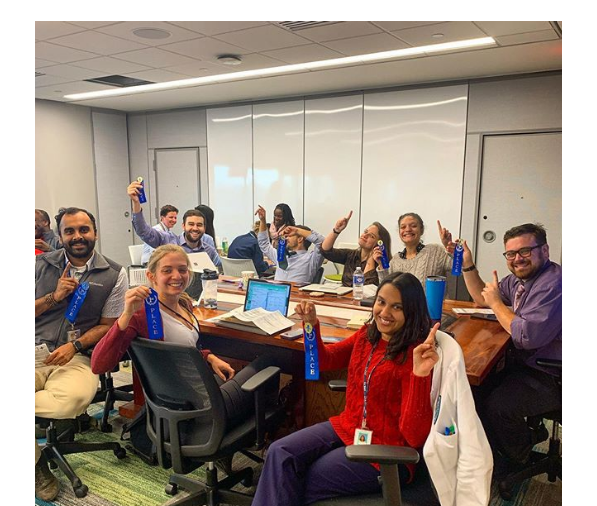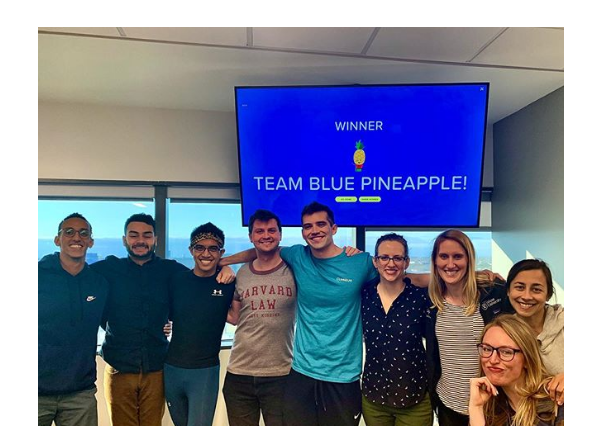
Education is the rule here at Tulane Internal Medicine. We believe that you learn medicine by being actively engaged in it, not by passively listening to someone drone on as PowerPoint slides click by. And just as Medicine is a team sport, learning in the context of a team of colleagues is more fun and effective than learning alone.
Therefore, the Tulane IM Residency has made several major strides in improving resident education as well as the daily life of our residents through systematic changes to the "standard" residency program. Here are a few that we have systematically incorporated into the program.
 Tulane Internal Medicine is the only truly resident-owned and resident-run program in the United States. This is accomplished by dividing the residency into five separate firms: Orange, Red, Blue, Yellow and Green. An assistant program director (permanently assigned to one firm) and a chief resident oversees each firm. Each resident is assigned to a firm at the beginning of their intern year, and each will stay in that firm until they reach the end of their tenure here at Tulane. This promotes maximum mentorship, collaboration, and enjoyment of fun activities amongst the different classes in your firm. Residents from your firm will become your lifelong friends.
Tulane Internal Medicine is the only truly resident-owned and resident-run program in the United States. This is accomplished by dividing the residency into five separate firms: Orange, Red, Blue, Yellow and Green. An assistant program director (permanently assigned to one firm) and a chief resident oversees each firm. Each resident is assigned to a firm at the beginning of their intern year, and each will stay in that firm until they reach the end of their tenure here at Tulane. This promotes maximum mentorship, collaboration, and enjoyment of fun activities amongst the different classes in your firm. Residents from your firm will become your lifelong friends.
Each firm operates like its own business, each run their own wards services at each of our hospitals. You are in control. We believe that you are the most confident, and most fulfilled when you are making the decisions for yourself.
Features of the Firm System:
- Making your Own Schedule: The medical wards at each hospital are divided into four services. Each firm is responsible for assigning one person to staff each ward at each hospital per four-week block. Who that person will be is up to you and your firm. The firm is also responsible for sending one person per month to staff the ICU and CCU assignments. In the spring of each year, the firm meets and comes up with the overall schedule for the next year.
 Maximal Exposure to your Colleagues: Because each firm sends one member to staff each of the teams, you will work with members of the other four firms each month. When in clinic, you will work directly with members of your firm, providing a balanced exposure to all team-members on the Tulane team.
Maximal Exposure to your Colleagues: Because each firm sends one member to staff each of the teams, you will work with members of the other four firms each month. When in clinic, you will work directly with members of your firm, providing a balanced exposure to all team-members on the Tulane team.- Intern Mentorship: Each intern is paired with residents from the same firm during each rotation. This provides the resident opportunities to provide meaningful feedback and guidance to each individual intern. We hold feedback meetings twice a year with all residents in the firm. Information is compiled and ultimately provided to each intern, individually with their chief resident and APD.
- Taking Control: Each firm designs its own Quality Improvement Project each year. Because the firms run their own show on their service and in their clinic, they have first-hand knowledge of what needs to be improved. With this each Tulane firm owns their own solutions. And in doing so, Tulane residents master the Systems of Care, and improve the skills of owning and operating his or her own clinical practice.
The definition of a good system is that it puts good people in good positions. The ACGME requires all internal medicine programs to have continuity clinic experience and the required number of clinic sessions is 150 half-day sessions over the three years. Most other residencies employ a system in which continuity clinics overlap with wards, electives and ICU rotations. While on the wards, for example, you can expect to be pulled away from the hospital one to two half-days per week to be in clinic. We believe that this “standard system” of overlapping clinics with ward/elective rotations has the best of intentions, but it fails us miserably. The following 4+1 system was developed here and is our solution to the problem. Many other internal medicine residencies have adopted a similar system.
The Ins and Outs:
- The year is divided into 10, five-week blocks, the remaining two weeks of the 52-week year are the winter holidays.
- The first four weeks of your block are devoted to wards, electives or ICU/ER rotations.
- The last week of the block is devoted solely to ambulatory clinics.
- There are five firms in the Tulane system, and each firm shifts blocks on a staggered basis. This means that one firm will always be on their “+1 week." Each of the other four firms will be in their “4 week block rotations.” There are no clinic days in this four week block.
The best part of this system is that it eliminates fragmentation, thereby increasing the efficiency of the day. Since there is no clinic in the afternoon, you obviously won’t be returning from clinic to complete unfinished ward business. One last great plus is that since our monthly schedule ends on a Friday at 5pm, you’ll have a guaranteed Friday night, Saturday and Sunday off prior to each +1 week. We here at Tulane are dedicated to ensuring each of our residents has a life outside of work, outside of the stress.

At Tulane Internal Medicine, there is no longer a noon conference schedule, or morning report. This ensures that Monday to Friday, residents can devote the noon hour to whatever seems most appropriate: expediting patient care, chalk talks during lunch, or attending rounds education. However, one day a week there is protected education time for residents. From 1pm to 5pm on Mondays, Attendings will take the Residents' pagers. The Attending and interns will work together in the afternoon to provide patient care while the resident is in Monday school.
Each Monday school is blocked into three separate segments:
- Board Review: The first hour is devoted to high-yield topic review, with focus on must know elements for the everyday life on the wards as well as the boards. Provided by our very own recent 2020 alumni Dr. Brady and Dr. Byrne.
- To the Tables! A mystery case is presented. Get yourself ready for a knock down drag out cost conscious competition for total residency wide domination. Each firm will receive the same mystery case. The firm's chief resident will facilitate each table's discussion, without giving away the answer. Chief residents will provide an expense report for each lab and imaging study that is ordered. The Firm that gets to the correct answer while spending the least amount of money wins!
- Guest Lectures: Following the mystery case, there will be one to two lectures provided by Tulane faculty, including sub-specialists and our own program leaders. Occasionally, we will also get members of the New Orleans community to provide lectures about projects going on in each aspect of the city.
At 1 PM on Fridays, the Resident takes the Interns' pagers, and the Attending and Resident work together to provide patient care in the afternoon.
From 1:30 PM to 4:30 PM, the interns have protected time. No pagers, no responsibilities. Just protected time to participate in their Friday School Seminar. Each seminar begins with an overall lecture, and then subsequently each firm separates and works on a mystery case much like Monday school. Except that the topics are focused at the level of the intern, both in complexity and in emphasis.
On-call interns return to the wards after Friday School. All other interns are off for the evening.
At the core of Monday/Friday school is teamwork, each of the firms work together to provide each other with opportunities for active learning. This academic half day model was developed here and is a key component of our residency, with lasting impacts on the way we all practice medicine, as medicine is at its very core a team sport.
